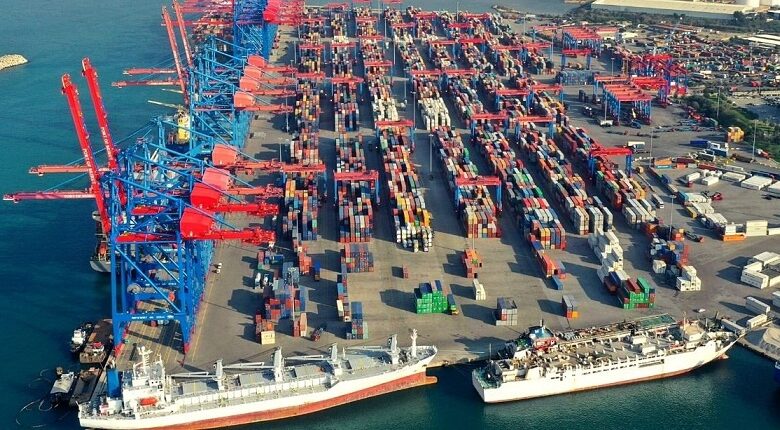يواصل المعنيون في القطاع الغذائي في لبنان تطمين المواطنين بأنه لا توجد مشكلة في الوقت الحاضر في البضائع، ولا انقطاع في السلع، رغم تسارع التطورات العسكرية بعد اغتيال إسرائيل الأمين العام لحزب الله حسن نصرالله إلى جانب العديد من القادة، وتوسيع إسرائيل عدوانها ومجازرها في العديد من المناطق اللبنانية، وذلك «طالما أن المرافق الجوية والبحرية لا يزال العمل فيها جاريا».
وتزداد هذه المخاوف أيضاً لدى المواطنين في ظل صعوبات تواجه العديد من الشاحنات في نقل بضائعها من منطقة إلى أخرى على وقع توسع الاحتلال في عدوانه، مما تُرجم بنقص في البضائع لدى بعض المحال والسوبرماركات ومع توسع رقعة الحرب والمواجهة واشتدادها يوماً يوم،ازدادت المخاوف لدى اللبنانيين من أن تأخذ منحى أشد قساوة،خصوصاً مع تزايد الحديث عن توجه اسرائيل بالقيام بحصار بري على لبنان تحت ذريعة التحكم بالمعابر لكي لا يصل لحزب لله سلاحاً عن طريق سوريا فاضافة إلى خوف النزوح جراء رسائل اخلاء البيوت من قبل الإسرائيليين،المترافقة مع الخوف على نجاح اسرائيل في محاولة خرق الإتصالات في لبنان،والمخاوف على لبنان غذائياً بالتحديد من هذه زاوية هذا الحصار الذي يجري التكلم عنه بات العين على المرفأ وقدرته على الصمود في حال كان التضييق البري لا يطاق ووصل إلى الإستيراد والتصدير،أو التضييق على الغذاء.
واذا أردنا التكلم عن مجال البحر في لبنان، فالعين ستتجه إلى مرفأ بيروت حكماً،هذا المرفأ الذي أخذ طريقه بالتعافي بعد ذلك الزلزال الذي كاد أن يبتلع بيروت في آب 2020 اليوم الأسود في حياة أهالي بيروت وسكانها،ففي ظل الخوف على لبنان بأسره من بطش اسرائيل به وتزايد تلك المخاوف من أن يكون الحصار البري هو التالي في ظل المخاوف المتزايدة على الأمن الغذائي في لبنان فهل الوضع بحرياً على ما يرام من ناحية تأمين المواد الغذائية، أو حتى من خلال عملية استمرار البضائع بشكل عادي عن طريق البحر في حال فرض حصار برياً من قبل اسرائيل،وهل هناك خطة موضوعة مخصصة لحالة الطوارئ في حال خرجت الأمور عن السيطرة لكي لا يقع لبنان في أزمة على هذا الصعيد وهل المرفأ قادر على تحمل هذا العبئ بمفرده؟
بالنسبة لعمليات الاستيراد والتصدير ، يقول رئيس مجلس إدارة مرفأ بيروت عمر عيتاني :» أن وتيرة العمل ما زالت طبيعية جداً، وبدأنا الآن العمل لتسريع عمليات اخراج السلع و البضائع من المرفأ بالتعاون مع الوزارات المعنية».
ويؤكد عيتاني على أنه في هذا الإطار حصل اجتماع مع غرفة التجارة والصناعة والهيئات الاقتصادية يوم الخميس الماضي وتم الإتفاق على تسريع وتيرة العمل لاخراج البضائع على ان يصار إلى تخزينها في مستودعاتهم الموجودة في المرفأ ، و حتى اليوم لا زالت القدرة موجودة على تلبية كل الخدمات والاحتياجات.
وعن وجود خلية ازمة، يشير إلى أنه تم عقد اجتماع في هذا الاطار مع الجهات المعنية و يصب بدورها في إطار تسهيل عمليات اخراج البضائع ودائما بالتنسيق مع الوزارات المعنية، على أمل ان يصدر بيان في هذا الاطار عن الحكومة تحث من خلاله الوزارات على تأمين المداومة في اداراتها خاصة تلك التي لديها مندوبين منوطة بهم عملية منح تأشيرات في المرفأ كوزارة الزراعة والاقتصاد والصحة والصناعة والبيئة.
وعن وجود خطة،يختم عيتاني قائلاً:» ننتظر ما سيصدر عن الحكومة في هذا الاطار ، ولا بد من التأكيد على اننا مرفق اقتصادي يعمل بكل مسؤولية على تأمين احتياجات البلد».
المصدر: عبدالرحمن قنديل – اللواء
### Protection of Goods and Food Security: Can Beirut Port Stand Up to the Challenge?
Officials in Lebanon’s food sector continue to reassure citizens that there are currently no issues with the supply of goods, nor is there a shortage of products, despite the rapidly evolving military situation following Israel's assassination of Hezbollah Secretary-General Hassan Nasrallah and other leaders. As Israel escalates its aggression and massacres across various Lebanese regions, the situation remains under control “as long as air and sea facilities remain operational.”
However, citizens' concerns are growing amid difficulties faced by many trucks in transporting goods from one region to another, which has resulted in a shortage of products in some shops and supermarkets. As the war expands and intensifies, fears among the Lebanese population are rising that the situation could worsen, especially with increasing talk of Israel imposing a land blockade on Lebanon. Israel claims it aims to control border crossings to prevent weapons from reaching Hezbollah through Syria.
In addition to fears of displacement due to evacuation warnings from the Israelis, there are also growing concerns about potential Israeli interference in Lebanon's communications systems. However, the most pressing concern is related to Lebanon's food security, particularly if this land blockade extends to import and export activities, thus threatening Lebanon’s access to essential goods.
Looking towards Lebanon's sea operations, all eyes are naturally on the Port of Beirut. This port, which has been recovering from the catastrophic explosion in August 2020, remains a crucial economic lifeline for the country. With concerns mounting over a potential land blockade, questions arise about the ability of Beirut Port to secure food supplies and whether maritime routes can maintain normal import flows if Israel imposes a land siege.
So, can Beirut Port handle the responsibility alone, especially if the situation spirals out of control?
Regarding import and export activities, Omar Itani, Chairman of the Port of Beirut, reassures: “Operations continue at a very normal pace, and we have started accelerating the process of clearing goods from the port in cooperation with the relevant ministries.”
Itani further explains that a meeting was held with the Chamber of Commerce and Industry and economic bodies last Thursday, where it was agreed to expedite the clearing of goods and store them in the port's warehouses. To date, Beirut Port is still capable of meeting all services and needs.
As for the existence of a crisis unit, Itani notes that a meeting was held with concerned parties to facilitate the clearing of goods, always in coordination with the relevant ministries. He expresses hope that the government will issue a statement urging ministries to ensure round-the-clock operations, especially those with representatives responsible for issuing permits at the port, such as the Ministries of Agriculture, Economy, Health, Industry, and Environment.
Regarding a comprehensive plan, Itani concludes: “We are waiting for what the government will announce in this regard, and it is essential to affirm that we are an economic facility committed to responsibly meeting the country’s needs.”
translated by economyscopes team
 سكوبات عالمية إقتصادية – EconomyScopes إجعل موقعنا خيارك ومصدرك الأنسب للأخبار الإقتصادية المحلية والعربية والعالمية على أنواعها بالإضافة الى نشر مجموعة لا بأس بها من فرص العمل في لبنان والشرق الأوسط والعالم
سكوبات عالمية إقتصادية – EconomyScopes إجعل موقعنا خيارك ومصدرك الأنسب للأخبار الإقتصادية المحلية والعربية والعالمية على أنواعها بالإضافة الى نشر مجموعة لا بأس بها من فرص العمل في لبنان والشرق الأوسط والعالم




